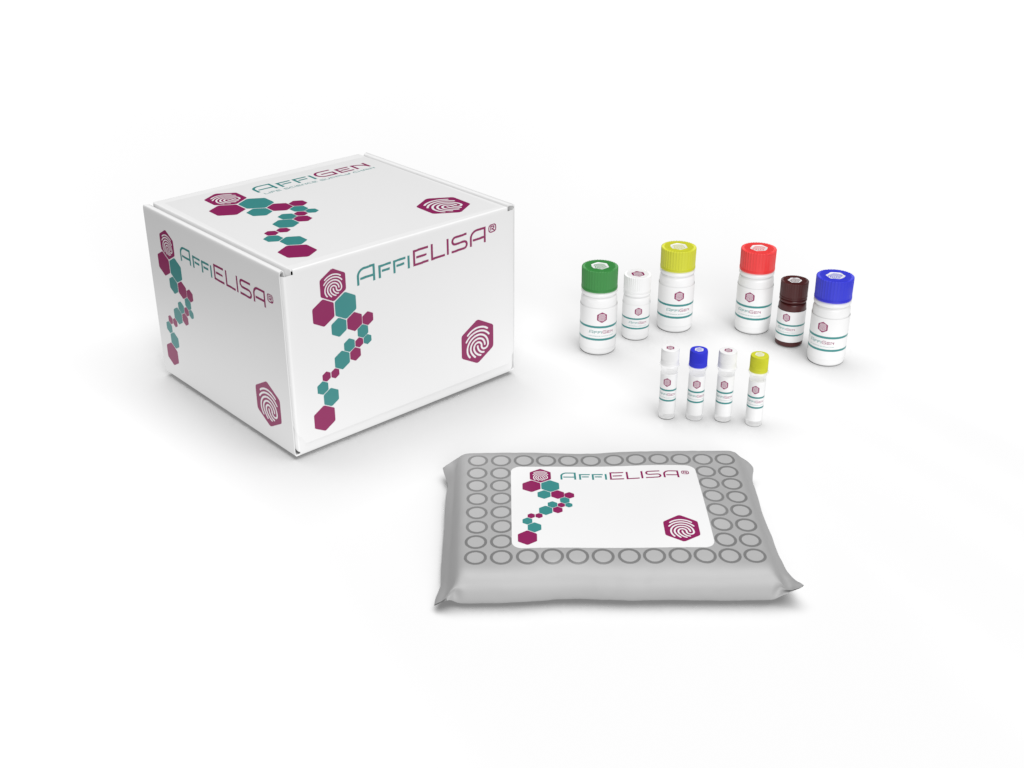AffiELISA® Human transfusion transimitted virus antibody IgM | TTV-IgM | ELISA Kit
The AffiELISA® Human Transfusion Transmitted Virus Antibody IgM (TTV-IgM) ELISA Kit is a laboratory assay designed for the detection and quantitative measurement of IgM antibodies specific to Transfusion Transmitted Virus (TTV) in human samples.
TTV is a single-stranded DNA virus discovered in the late 1990s that has been found in the blood of healthy individuals as well as in those with certain diseases. TTV is transmitted through blood transfusions, organ transplants, and other routes of exposure to blood or blood products. Its significance in causing disease or its role in health remains a subject of ongoing research and debate.
IgM antibodies are typically the first antibodies produced by the immune system in response to an infection or exposure to a pathogen like TTV. ELISA kits that detect IgM antibodies against TTV enable the identification of recent or acute TTV infections in individuals.
The kit utilizes antibodies that specifically recognize IgM antibodies produced against TTV in human samples, allowing for the accurate measurement and quantification of these antibodies. This can be particularly useful in:
- Screening: Identifying recent or acute TTV infections in individuals, especially in blood donors or transfusion recipients.
- Epidemiological Studies: Investigating the prevalence and incidence of TTV infections in different populations.
- Research: Studying the immune response to TTV infections and their potential implications for health.
However, it's important to note that the clinical significance of TTV infections, particularly in healthy individuals or their association with specific diseases, is still not fully understood. Tests like the TTV-IgM ELISA kit aid in understanding the prevalence and immune response to TTV but might not necessarily indicate disease presence or severity. Interpretation of results should be done in conjunction with clinical assessment and other diagnostic factors.
Product Specifications
Species
Human
Gene / Target
TTV-IgM
Uniprot ID
N/A
Type
Qualitative
Sample Volume
10 µL
Wavelength
450nm
Human transfusion transimitted virus Background
Transfusion Transmitted Virus (TTV) is a single-stranded DNA virus that was discovered in the late 1990s. It's classified within the Anelloviridae family and is known for its prevalence in human blood samples.
Key points about TTV:
- Transmission: TTV can be transmitted through various routes, including blood transfusions, organ transplants, and other exposures to blood or blood products. However, the exact modes of transmission and the significance of TTV infection remain under investigation.
- Prevalence: TTV has been found to be widespread in the general population. It's often detected in healthy individuals as well as in those with certain diseases. Its prevalence varies across different geographic regions and populations.
- Association with Disease: The clinical significance of TTV infections remains uncertain. While it has been detected in individuals with liver diseases, immune disorders, and other conditions, its direct role in causing disease or its association with specific illnesses is still not fully understood.
- Immune Response: When the immune system encounters TTV, it generates antibodies in response to the virus. Tests like ELISA kits that detect antibodies specific to TTV (such as TTV-IgM or TTV-IgG ELISAs) aid in identifying recent or past TTV infections and studying the immune response to the virus.
The significance of TTV infections in human health is an ongoing area of research. While TTV has been detected in blood samples and linked to certain conditions, its role as a pathogen or its impact on human health requires further investigation to understand its clinical implications accurately. Testing for TTV antibodies helps in studying its prevalence, immune response, and potential associations with diseases, contributing to ongoing research in virology and infectious diseases.
